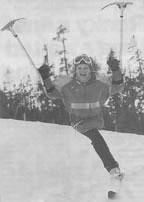
One-Legged
Skier Finds Freedom
Winter Park woman calls sport ‘the great equalizer’
By The Associated Press
WINTER PARK –
“ Aaaooo,” Cale Kenney howls as she swoops down the slopes, all breathless
bravado and grace.
Past the group of blind skiers, she flies, a shower of fresh powder in her wake.
“I can ski! I can ski!” she whoops at the instructor, a longtime friend and skiing partner, who grimaces in reply.
Swoosh. Kenney crunches to a halt on a precarious slope and starts looping through the snow in a kind of liquid waltz.
“Ball…room skiing,” she sings, her body swaying to the rhythm of her lone blue ski. Then she’s off again, slicing down the mountain in a clear crisp line.
It’s hard to believe this one-legged skier, this poet, once described herself as “a perturbed flamingo.”
Today, the only connection to the exotic bird is her shocking pink ski gear. Kenney has become one of the wild women she writes about, an irrepressible athlete and writer who knows exactly where she is going – and the effect she is having along the way.
“At my navel, I am making a statement,” she muses in a poem in which she fantasizes about being a mermaid. “I can be any shape I want to be, and no one can stop me.”
Kenney has been making a statement ever since the motorcycle accident that in 1971 cost her a leg, hip, pelvis and friend. She was 19 at the time, a blonde Boston rebel whose athletic experience was limited to running from the cops and bowling, so she could “wear the shoes and be ogled by boys.”
The accident devastated her body, and for a time, her spirit.
Skiing, Kenney says, gave her back both.
She pauses on a ridge halfway down the slopes and inhales the mountain air. The Rockies seem to stretch forever, their peaks glistening like diamonds on the horizon. The spring snow is crunchy underfoot.
“Here,” Kenney says, “you become very sure of what is important.”
It took awhile to get here – to this peak, to this consciousness.
Kenney’s first forays onto Haystack Mountain in Vermont in the mid-1970s were a disaster. She hated her butt-less body, hated the cold, the spills, the stares. The only redeeming part was the hot chocolate and Schnapps with the guys après ski.
But a friend kept pushing, and her pride kept pricking and finally she mastered balancing on one ski. She wears no artificial leg and holds a pair of “outriggers” – crutch-like poles with mini ski-tips on the end that act as stabilizers.
Now Kenney, 46, writes freely about the experience in articles for Howlings, the magazine she publishes for the “wild women of the West.” The name was inspired by the Warren Zevon song, “Werewolves of London,” whose howl Kenney mimics when she’s tearing down the slopes.
Kenney calls skiing “the great equalizer," which is one reason she loves it so much – enough to move to Colorado in 1977, without her doctor, her mother or a job. In this sport, everyone falls, even champions. Everyone gets injured. Everyone plays the fool.
“Follow the blue powder road,” Kenney writes about those glorious early days when lift passes were free and Social Security paid her rent.
Sometimes she coached other skiers. Mostly she would swing up the mountain on an early-morning chairlift and pick a solitary trail back down. During these long days on the mountain, Kenney says, her spirit was called back to her new body “to be trusted again.”
Skiing gave her enough confidence to hobble into the local newspaper to ask for a job. Kenney started working at The Winter Park Manifest.
She went to speed-skiing trials and interviewed Olympic champions. She wrote about advances in equipment for disabled skiers. She became a fixture on the mountain and in town, hobbling around on crutches with her notebook, smile and mop of curls, poking fun at the ski world and life in general.
“My guts and gumption period,” she calls it, and it landed her in the center of top-level competitive sports.
National champion in 1979; seventh in the Olympics for the disabled in Norway in 1980; two silver medals in nationals in 1983.Kenney loved the travel, the glory and the fun. And she learned about the “suffering side” of skiing, when she injured her knee two days before the U.S. team left for the 1982 Olympics.
The injury knocked her out of competition and back into writing, into a serious, more reflective self.
Still, that impish delight in shocking the world never is far from the surface.“What happened?” a little girl gasps in the Winter Park locker room, staring at the empty space where Kenney’s left leg belongs.
“Motorcycle.” Kenney replies, as she slips out of a ski suit and into a dress.
She winks at the adults. “Usually, I say ‘shark.' ”